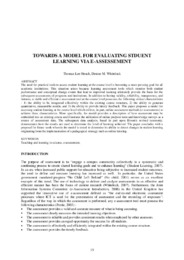Towards a model for evaluating stduent learning via e-assessement
Abstract
The need for practical tools to assess student learning at the course level is becoming a more pressing goal for all academic institutions. This situation arises because learning assessment tools which monitor both student performance and conceptual change events that lead to improved learning ultimately provide the basis for the subsequent assessments of programs and institutions. In addition to having validity, reliability, transparency, and fairness, a viable and efficient e-assessment tool at the course level possesses the following critical characteristics - 1) the ability to be integrated effectively within the existing course structure, 2) the ability to generate quantitative, measurable results, and 3) the ability to provide timely feedback. This paper proposes a model for assessing student learning at the course level which utilizes, in part, online assessment methods (e-assessments) to achieve these characteristics. More specifically, the model provides a description of how assessment may be embedded into an existing course and illustrates the utilization of online pre/post-tests and knowledge surveys as a source of assessment data. The subsequent data analysis, based in part upon Bloom's revised taxonomy, demonstrates how the results are used to determine the level of learning achieved. The paper concludes with a proposal for future work wherein the model is tested to determine its ability to detect changes in student learning originating from the implementation of a pedagogical strategy such as online tutoring.
